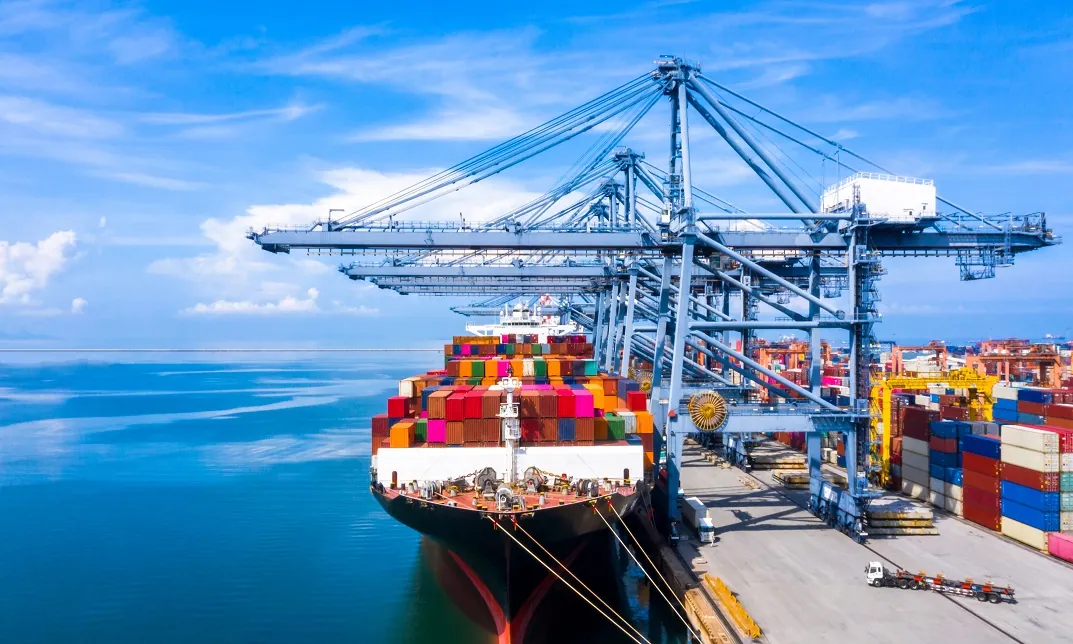No products in the basket.
The global economy runs on the smooth movement of goods across vast distances. At the centre of this trade web are ports, bustling hubs where ships, cargo, and people converge. But how do these critical points keep running efficiently? You’ll see how port management affects our everyday lives, from the clothes you’re wearing to the price of your morning coffee.
In this blog post, we’ll explore port management, what it entails, why it’s crucial, and how it impacts our daily lives.
What is port management?
Port management is the planning, coordination, and oversight of all activities that take place within a port. It’s essentially the brain and nervous system of a busy seaport, ensuring everything runs smoothly and efficiently.

It handles everything from managing ship traffic and deciding where ships should dock to making sure cargo gets loaded and unloaded smoothly. It also deals with paperwork and checks to get people and goods in and out of the port. Safety and security are really important, too, making sure everyone and everything stays safe.
Port management also focuses on making the port attractive for businesses by improving facilities and keeping costs competitive. Overall, it’s about making sure the port runs well, helping trade and the economy to grow.
What is the role of a port manager?
A port manager acts as the executive leader, overseeing a port facility’s strategic and day-to-day operations. Their primary role is to ensure efficient, safe, and secure cargo movement through the port. This encompasses a range of critical functions:
- Strategic Planning: Port managers develop long-term strategies and plans for the port. Hence, they need to consider factors like infrastructure development and market trends.
- Traffic Management: As port managers, they have to manage vessel traffic, deciding when and where ships dock and coordinating berthing allocations to optimise space utilisation
- Regulatory Compliance: Port management, where managers must ensure that the port complies with relevant regulations and standards. Those include safety, security, environmental, and customs requirements.
- Safety and Security: The safety of personnel, cargo, and the environment is paramount. Port managers implement robust security measures to prevent theft and ensure adherence to environmental regulations.
- Financial Management: Port managers are responsible for budgeting, cost control, and revenue generation. Thus, they aim to achieve financial sustainability and profitability for the port.
- Human Resource Management: Effective port management requires a skilled workforce. Port managers oversee personnel, ensuring proper training, safety protocols, and efficient labour allocation.
In essence, a port manager is a strategic architect and operational leader, ensuring the smooth functioning of a complex system vital to global trade.
Strategies for Effective Port Management
A well-managed port is a vital cog in the global trade machine, and technology is the grease that keeps it running smoothly. By investing in modern port management systems, ports can streamline operations, improve efficiency, and enhance visibility across the supply chain. Here are some specific examples of how technology can empower effective port management. Here are some key strategies that can keep your port humming:
Embrace technology
Invest in modern port management systems to streamline operations. These could include cargo tracking software, automated gates, and real-time data analysis to optimise resource allocation and minimise wait times.
Prioritise efficiency
Focus on smooth cargo flow through continuous process improvement. This might involve optimising berth allocation and minimising vessel turnaround times. Also, invest in efficient cargo-handling equipment.
Cultivate Strong Partnerships
Build collaborative relationships with shipping lines, freight forwarders, and logistics companies. This fosters trust, facilitates communication, and allows joint efforts to improve supply chain efficiency.
Invest in Infrastructure
Regularly assess and upgrade port infrastructure. Those include berths, terminals, and access roads. This ensures the port can accommodate larger vessels and handle the ever-growing global trade volume.
Focus on Sustainability
Implement green initiatives to reduce the environmental impact of port operations. This could include investing in cleaner-burning equipment.
Develop a Talented Workforce
Train and retain a skilled workforce capable of operating complex port equipment, handling intricate customs procedures, and ensuring smooth port operations.
Stay Competitive
Continuously benchmark your port’s performance against industry leaders. Analyse best practices and adapt your strategies to stay ahead of the curve in the competitive global trade landscape.
Prioritise Security
Implement robust security measures to deter theft, prevent unauthorised access, and ensure the safety of cargo and personnel.
Engage with Stakeholders
Maintain open communication with all stakeholders, including local communities, businesses, and regulatory bodies. This fosters transparency, builds trust, and allows for collaborative problem-solving.
Challenges in Port Management
Even the most skilled port managers face various challenges. These obstacles can hinder efficiency, delay cargo movement, and impact the port’s competitiveness. Here’s a look at some of the major challenges in port management:
- Congestion: Busy ports can become overwhelmed with ship traffic, leading to delays in vessel turnaround times and cargo handling. Limited infrastructure, inefficient processes, or unexpected disruptions can exacerbate this.
- Infrastructure Limitations: Outdated equipment, inadequate storage facilities, or shallow harbour depths can restrict a port’s ability to handle larger vessels and the ever-increasing cargo volume.
- Labour Issues: Skilled labour shortages can significantly disrupt port operations. Ensuring a well-trained and motivated workforce is crucial for smooth cargo movement.
- Security Threats: Ports are vulnerable to theft, smuggling, and even terrorism. Implementing robust security measures requires ongoing vigilance and adaptation to evolving threats.
- Environmental Regulations: Balancing economic growth with environmental responsibility is a constant challenge. Ports need to comply with stricter regulations regarding pollution control, waste management, and energy efficiency.
- Competition: The global trade landscape is fiercely competitive. Ports need to continuously innovate, improve efficiency, and offer competitive fees to attract shipping lines and cargo.
- Technological Disruption: The rapid pace of technological advancement can be both an opportunity and a challenge. Ports need to stay updated on emerging technologies and invest in systems that can optimise operations and enhance data-driven decision-making.
- Geopolitical Instability: Political tensions and global disruptions can disrupt trade patterns and impact cargo flow through specific ports. Adaptability and contingency planning are crucial for navigating these uncertainties.
Despite these challenges, effective port management strategies can help mitigate their impact. By investing in infrastructure upgrades, embracing technological solutions, prioritising security, and fostering strong partnerships, ports can navigate these obstacles and remain vital hubs for global trade.
Conclusion
Port management is the invisible hand that keeps goods flowing smoothly across the oceans. It also ensures that everything from your morning coffee to the clothes on your back reaches its destination efficiently. Effective port management is about fostering economic growth, creating jobs, and ensuring a strong and competitive supply chain. By understanding the various aspects of port management, the challenges it faces, and the strategies for success. Hence, we gain a deeper appreciation for the complex world of ports.




